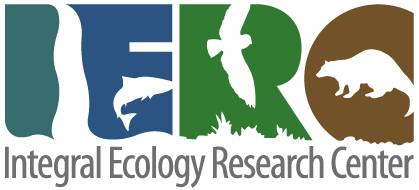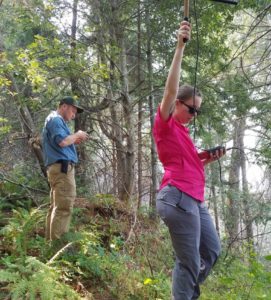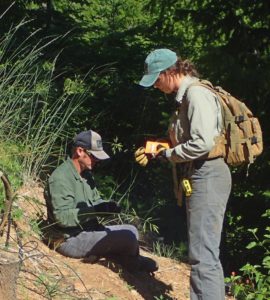Young Professional Development Internship
2018 Recipients
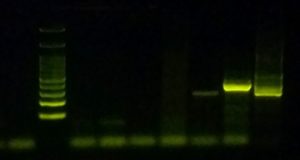
An example of the molecular ecology work 2018 Young Professional Development (YPD) interns gained experience on. Here are the gel electrophoresis results after carnivore scat samples were collected in the field by YPD interns, extracted for genomic DNA, and run with felid specific primers through polymerase chain reactions (PCR).
2018 was the inaugural year of our Young Professional Development (YPD) Internship program. Two interns participated, Chelcie Pierce and Aedan McCluskey. Chelcie and Aedan worked for three months at IERC under the YPD program where they shadowed IERC team scientists and learned new skills. They also were able to work closely alongside other scientists and personnel from other non-profit organizations, and local, state or federal agencies.
Chelcie joined us from Oklahoma, where she received her Bachelor’s and recently her Master’s degrees in Zoology from Oklahoma State University. Her thesis focused on the parasite communities of tadpoles. Through the YPD program, Chelcie gained valuable experiences learning a variety of natural resource field and analytical capabilities to use in the future.
Aedan recently graduated from the Wildlife Department at Humboldt State University and was accepted into the YPD program shortly after her graduation. During her academic pursuits, Aedan worked in the field on various projects including a study on hummingbirds. However, the YDP was an opportunity to take the knowledge she learned in the classroom setting and apply it towards active conservation programs IERC leads.
Both Chelcie and Aedan worked closely with IERC Science Team members on various laboratory and field projects.
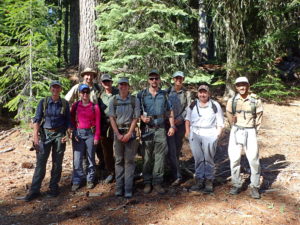
A perfect example where the 2018 Young Professional Development interns had the experience of working with the full IERC staff.
For field work, they participated in our carnivore density estimation project in which they followed IERC protocols, and identified and collected carnivore scats for both genomic and pathogenic DNA analysis. On this same project, both YPD interns learned to extract genomic and pathogenic DNA from these carnivore scats. Then they assisted in the running of a polymerase chain reaction (PCR) to amplify both types of DNA and in gel electrophoresis to illuminate PCR amplicons of positive samples. They also participated in VHF telemetry exercises where they triangulated on bobcats IERC has collared. They also gained hands-on experience in learning the tools and techniques to download GPS data stored on these bobcat collars and the use of remote camera systems to capture wildlife. One of the larger projects IERC immersed the interns in was the documentation and restoration of public land cannabis grow sites. Interns learned how to use resource grade GPS units to precisely map cannabis site attributes, collected data and assisted in the reclamation of sites. Finally, with all of these productive fieldwork experiences, IERC Team members taught them how to input data into Access or Excel databases, generate maps using the ArcMap Geospatial Informational System (GIS) program and aided in the writing and generation of scientific reports for public and funder dissemination. This was a packed learning experience for Chelcie and Aedan which we at IERC feel added strength to their foundational knowledge to be successful and tackle the natural resources world!
